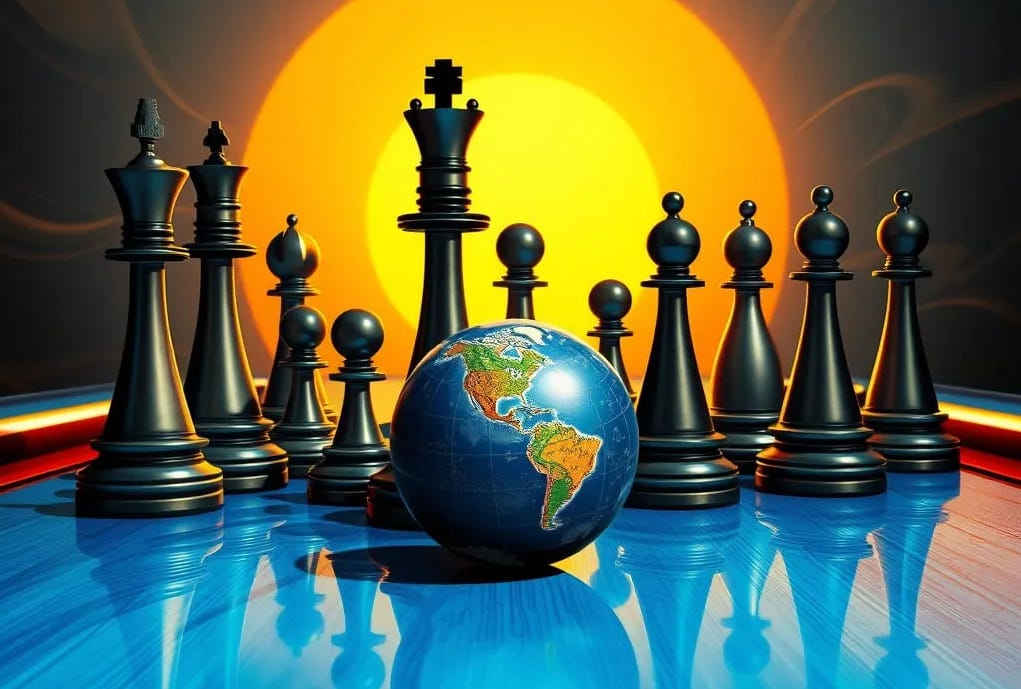Reality Bites – The Return of Great Power Politics
When you spend most of your time observing the world, it's easy to understand cause and effect. Things make sense in a way that they don't, or shouldn't, to those who get their political opinions from the nightly news or whatever's trending on social media. So if you'd been paying attention for say, the last 10 years, you'd have the proper context for understanding whatever geopolitical flash point is now in the headlines. For example: No, Russia did not invade Ukraine in an unprovoked act of aggression, any more than ‘October 7’ was unprovoked. Nothing happens in a vacuum.
The same is true when you read history. Great power politics is not something we've really seen in our lifetimes, apart from the Cold War, which was more of a geopolitical balancing act involving 'third countries' rather than the US and USSR going toe to toe.
All of that has now changed. To understand the present moment you need to look back about 150-200 years, to the world order that emerged out of the Napoleonic Wars. The Concert of Europe is the name given to the system of diplomacy which maintained the balance of power, political boundaries, and spheres of influence across Europe for most of the 19th century. Comprising Britain, France, Russia, Prussia, and Austria, the Concert, also known as the Vienna System, was essentially a consensus among the ruling European monarchies assuming the right to impose their collective will on smaller states, ostensibly for the purpose of preserving the peace. In reality it functioned as a bulwark against nationalist aspirations among the periphery states.
This world order was torn apart when WWI effectively destroyed most of Europe. The US, not being directly involved, came out relatively unscathed, setting it up to be the new Western 'superpower', vis-à-vis the newly industrialised USSR. This uneasy peace has been referred to as the Pax Americana.
In our lifetimes we’ve seen the end of the Cold War wherein the US proudly declared itself the victor and Francis Fukuyama somewhat prematurely declared ‘the End of History’. The West’s uni-polar moment lasted a decade. Since then it’s been on a genocidal rampage spreading ‘democracy’ across Eastern Europe, West Asia and North Africa, basically a turf war to mop up former Soviet satellite states and balkanise any political entity which could potentially harbour a threat to its absolute hegemony.
Russia’s intervention in the Syrian conflict was a pivotal moment for US policymakers, in no small part contributing to the rise of populism in America, in the form of the shockingly rude, arrogant, brash, unapologetic, and generally misunderstood personage of Donald Trump. The Trump era also marks the rise and gradual acceptance of what has come to be known as the ‘multi-polar’ world order. (Even Marco Rubio is using the expression now.)
The multi-polar world is nothing new. It is simply a return to the old system of diplomacy which existed in Europe in the 19th century, albeit on a global scale. Go back further still and you’ll find an earlier template in the Peace of Westphalia, the 1648 treaty which marked the end of the 30 years war. If you listen today you will hear the same rhetorical bullshit about the importance of ‘sovereignty’ and ‘self determination’ of ‘nation states’. A term you won’t hear explicitly is ‘spheres of influence’, but if you listen very carefully you might hear the occasional hushed mention of the ‘Donroe doctrine’.
Today we see the US retreating from its NATO obligations, and from Europe more generally, while the UK with its motley crew of NATO allies still clings desperately to the fantasy of ‘winning’ the War in Ukraine. Perhaps the UK now sees Europe as its new sphere of influence. We’ll see how that plays out.
The wildcard in the pack is Erdogan, who apparently sees himself as not only the Sultan of the neo-Ottoman Empire, but also as the new leader of the Muslim world. Türkiye, with a standing army of over 400,000 active personnel, is a member of NATO, but not the EU. Where Türkiye stands in regard to Kier Starmer's 'coalition of the willing' (yes, the’s really calling it that) depends entirely on Erdogan’s geostrategic ambitions.
This is the reality on the ground. This is the world we now live in. The US under Trump appears to be retreating to its own hemisphere, no longer to play part of the playground bully; something for which we should all no doubt be grateful. But neither does it seem interested in playing the role of the world's policeman, which may raise concerns for some. The 'rules based order', such as it was, is dead and gone, along with the 'Washington consensus', and other such empty rhetoric. NATO was always a protection racket, but in Trump’s America, all pretences have been dropped.
So here we are, in an interregnum of sorts, waiting to see how power and geostrategic influence coalesce and what form the new balance of power will take. The 20th century, with its bi-polar and unipolar tendencies, was an historical anomaly; the exception to the rule. Great power politics is back. And that’s without even mentioning China.

